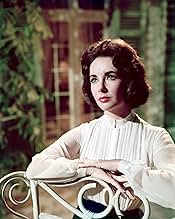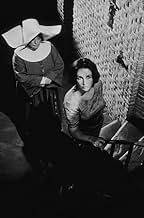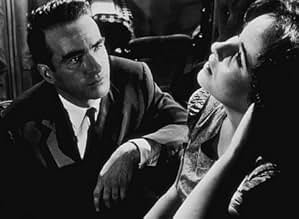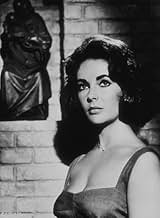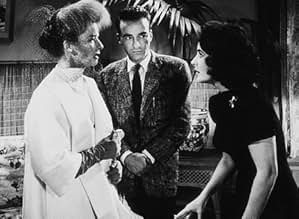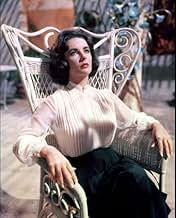IMDb-BEWERTUNG
7,5/10
18.446
IHRE BEWERTUNG
Ein Chirurg wird mit dem Fall einer jungen Frau beauftragt, deren Tante möchte, dass sie lobotomiert wird, um ein Familiengeheimnis zu verbergen.Ein Chirurg wird mit dem Fall einer jungen Frau beauftragt, deren Tante möchte, dass sie lobotomiert wird, um ein Familiengeheimnis zu verbergen.Ein Chirurg wird mit dem Fall einer jungen Frau beauftragt, deren Tante möchte, dass sie lobotomiert wird, um ein Familiengeheimnis zu verbergen.
- Für 3 Oscars nominiert
- 4 Gewinne & 7 Nominierungen insgesamt
Sheila Robins
- Dr. Hockstader's Secretary
- (as Sheila Robbins)
Erik Chitty
- Asylum Inmate
- (Nicht genannt)
Grace Denbeigh-Russell
- Asylum patient
- (Nicht genannt)
Brenda Dunrich
- Nurse
- (Nicht genannt)
Eddie Fisher
- Street Urchin
- (Nicht genannt)
Anthony Lang
- Inmate
- (Nicht genannt)
Aileen Lewis
- Nurse
- (Nicht genannt)
Empfohlene Bewertungen
Katharine Hepburn is a wealthy woman who uses her checkbook in the hopes of having her niece lobotomized in "Suddenly, Last Summer," a 1959 film directed by Joseph Mankiewicz and starring Elizabeth Taylor, Katharine Hepburn, Montgomery Clift, and Mercedes McCambridge.
Hepburn plays Mrs. Venable, whose son, Sebastian, died the previous summer of a heart attack. However, her niece Cathy, who accompanied Sebastian, has had a sort of breakdown and is institutionalized.
Mrs. Venable wants Cathy lobotomized. Before doing so, however, the gifted surgeon (Clift), sent there by his boss as Mrs. Venable dangles money for the hospital in front of him, becomes determined instead to find out what happened and how Sebastian really died.
This is a film that would never be made today - it's character-driven and has too much dialogue. It's a shame because the dialogue is excellent. A previous Mankiewicz film, "All About Eve," is word-rich as well, and there the dialogue sparkles. Here it is more poetic. And, like "Eve," the great roles are the womens.
Though references to homosexuality are only inferred, this film and the much more poorly adapted "Cat on a Hot Tin Roof" hold up very well today. With homosexuality much more discussed, the role this plays in both plots is very obvious, at least to this viewer.
In "Suddenly, Last Summer," Sebastian's proclivities are evident from the beginning as Mrs. Venable describes an almost husband-wife relationship with her son, claiming to the surgeon that Sebastian was "chaste" and that her relationship with him was enough for her son.
One of the comments here mentioned that "Cathy is crazy, like all Williams heroines." But in truth, Cathy like Blanche is disturbed (though Blanche may be a little closer to being nuts) and both are "put away" to shut them up - Blanche for her accusations against Stanley and Cathy because she knows how Sebastian really died.
Katharine Hepburn gives a brilliant performance as Mrs. Venable - charming but made of steel, her anger and jealousy toward her niece just barely beneath the surface.
Elizabeth Taylor gives one of her best performances under the strong direction of Mankiewicz. Taylor was blessed with great beauty but alas, not a great speaking voice. However, she is nevertheless very effective, particularly in her long, harrowing monologue near the end of the film.
Clift's passive portrayal of the surgeon is problematic, and one wonders why he was cast. The opening scene in which he performs an operation had to be redone many times because of his drunkenness and codeine addiction - he was washing down the pills with brandy; his voice quavers, he is unsteady on his feet, and his eyes are glassy.
He comes off a little better in the previous year's "Lonelyhearts," though in that film, he actually winces in pain when he has to sit. While Clift had the support of his fellow actors, he had none from Mankiewicz and producer Sam Spiegel.
Had it not been for Elizabeth Taylor's insistence, he would have been replaced. It seems cruel (as it did to Hepburn at the time) but Mankiewicz was trying to make a movie and Spiegel wanted it to be on budget - Clift's addictions and physical problems weren't helping. He couldn't remember lines; when he finally said them, he was often inaudible; and he was always late arriving on the set.
Fortunately for audiences, this wasn't his last big-budget role. Under the direction of Elia Kazan, he would do the magnificent "Wild River" and seemingly be more in control.
Despite this, "Suddenly, Last Summer" is an excellent, disturbing film, and is highly recommended. It's not Williams' best play, but it is served well in its film adaptation.
Hepburn plays Mrs. Venable, whose son, Sebastian, died the previous summer of a heart attack. However, her niece Cathy, who accompanied Sebastian, has had a sort of breakdown and is institutionalized.
Mrs. Venable wants Cathy lobotomized. Before doing so, however, the gifted surgeon (Clift), sent there by his boss as Mrs. Venable dangles money for the hospital in front of him, becomes determined instead to find out what happened and how Sebastian really died.
This is a film that would never be made today - it's character-driven and has too much dialogue. It's a shame because the dialogue is excellent. A previous Mankiewicz film, "All About Eve," is word-rich as well, and there the dialogue sparkles. Here it is more poetic. And, like "Eve," the great roles are the womens.
Though references to homosexuality are only inferred, this film and the much more poorly adapted "Cat on a Hot Tin Roof" hold up very well today. With homosexuality much more discussed, the role this plays in both plots is very obvious, at least to this viewer.
In "Suddenly, Last Summer," Sebastian's proclivities are evident from the beginning as Mrs. Venable describes an almost husband-wife relationship with her son, claiming to the surgeon that Sebastian was "chaste" and that her relationship with him was enough for her son.
One of the comments here mentioned that "Cathy is crazy, like all Williams heroines." But in truth, Cathy like Blanche is disturbed (though Blanche may be a little closer to being nuts) and both are "put away" to shut them up - Blanche for her accusations against Stanley and Cathy because she knows how Sebastian really died.
Katharine Hepburn gives a brilliant performance as Mrs. Venable - charming but made of steel, her anger and jealousy toward her niece just barely beneath the surface.
Elizabeth Taylor gives one of her best performances under the strong direction of Mankiewicz. Taylor was blessed with great beauty but alas, not a great speaking voice. However, she is nevertheless very effective, particularly in her long, harrowing monologue near the end of the film.
Clift's passive portrayal of the surgeon is problematic, and one wonders why he was cast. The opening scene in which he performs an operation had to be redone many times because of his drunkenness and codeine addiction - he was washing down the pills with brandy; his voice quavers, he is unsteady on his feet, and his eyes are glassy.
He comes off a little better in the previous year's "Lonelyhearts," though in that film, he actually winces in pain when he has to sit. While Clift had the support of his fellow actors, he had none from Mankiewicz and producer Sam Spiegel.
Had it not been for Elizabeth Taylor's insistence, he would have been replaced. It seems cruel (as it did to Hepburn at the time) but Mankiewicz was trying to make a movie and Spiegel wanted it to be on budget - Clift's addictions and physical problems weren't helping. He couldn't remember lines; when he finally said them, he was often inaudible; and he was always late arriving on the set.
Fortunately for audiences, this wasn't his last big-budget role. Under the direction of Elia Kazan, he would do the magnificent "Wild River" and seemingly be more in control.
Despite this, "Suddenly, Last Summer" is an excellent, disturbing film, and is highly recommended. It's not Williams' best play, but it is served well in its film adaptation.
This screen version, by Joseph L Mankiewicz, of Tennessee Williams' play isn't as highly thought of as it should be. It's not a classic and on occasions it comes over as crude and stilted, but it also has many fine things going for it. Although he never really opens it out, Mankiewicz gives it a fluency that isn't at all theatrical and although he often films scenes intimately and between only two characters, he ensures it is photographed and cut in a very cinematic fashion.
Unfortunately, one of the two people on screen during these 'cinematic' sequences is Montgomery Clift who is at his worst here. It was after his accident and he looks as if he's in pain. When he walks it's as if there is a board up his back and he talks as if out of the side of his mouth. Luckily, with him in these scenes is either Elizabeth Taylor or Katharine Hepburn or both and when they are on screen you don't pay too much attention to Clift.
Dilys Powell said Elizabeth Taylor was born to play Tennessee Williams and she was right. Indeed this may be her best performance after "Virginia Woolf". Catherine's lines don't have the kind of poetry in them that Violet Venable's does but Taylor finds a poetry of her own in her readings. She builds on her long speech at the end and is very moving, even if Mankiewicz can't resist 'showing' us, in flashbacks, what Taylor is telling us, as if he doesn't trust an audience to sit still and just listen to Taylor. (They would have to in the theatre).
As Violet, Hepburn has the showier part and she milks it for all it's worth. It's a great piece of acting because Violet never seems to be acting, though she tends to think of her life as a kind of performance, something she has passed on to her homosexual son, Sebastian. (If the old adage, 'my mother made me a homosexual', has any validity you don't have to look any further than here). She enters from above, descending in her small baroque lift, and Hepburn can see the comic potential in such an entrance. Moments later, however, she is recounting how the sea-turtles were devoured by flesh-eating birds in the Galapogos, and you can see just how dangerously unstable this woman really is.
Any film that has acting of this calibre automatically qualifies as worth seeking out, (you forgive the lame work of Clift and Gary Raymond and draw a blind over Mercedes McCambridge, though Albert Dekker is very fine), but this qualifies on other grounds; as one of the better Tennessee Williams adaptations, (he co-wrote it with Gore Vidal), as a flawed, dated but strangely fascinating example of how Hollywood viewed homosexuality at the time, (negatively, naturally, but any face, no matter how horribly distorted, so long as it was in the public gaze, was better than no face at all), and as a serious addition to the Joe Mankiewicz canon.
Unfortunately, one of the two people on screen during these 'cinematic' sequences is Montgomery Clift who is at his worst here. It was after his accident and he looks as if he's in pain. When he walks it's as if there is a board up his back and he talks as if out of the side of his mouth. Luckily, with him in these scenes is either Elizabeth Taylor or Katharine Hepburn or both and when they are on screen you don't pay too much attention to Clift.
Dilys Powell said Elizabeth Taylor was born to play Tennessee Williams and she was right. Indeed this may be her best performance after "Virginia Woolf". Catherine's lines don't have the kind of poetry in them that Violet Venable's does but Taylor finds a poetry of her own in her readings. She builds on her long speech at the end and is very moving, even if Mankiewicz can't resist 'showing' us, in flashbacks, what Taylor is telling us, as if he doesn't trust an audience to sit still and just listen to Taylor. (They would have to in the theatre).
As Violet, Hepburn has the showier part and she milks it for all it's worth. It's a great piece of acting because Violet never seems to be acting, though she tends to think of her life as a kind of performance, something she has passed on to her homosexual son, Sebastian. (If the old adage, 'my mother made me a homosexual', has any validity you don't have to look any further than here). She enters from above, descending in her small baroque lift, and Hepburn can see the comic potential in such an entrance. Moments later, however, she is recounting how the sea-turtles were devoured by flesh-eating birds in the Galapogos, and you can see just how dangerously unstable this woman really is.
Any film that has acting of this calibre automatically qualifies as worth seeking out, (you forgive the lame work of Clift and Gary Raymond and draw a blind over Mercedes McCambridge, though Albert Dekker is very fine), but this qualifies on other grounds; as one of the better Tennessee Williams adaptations, (he co-wrote it with Gore Vidal), as a flawed, dated but strangely fascinating example of how Hollywood viewed homosexuality at the time, (negatively, naturally, but any face, no matter how horribly distorted, so long as it was in the public gaze, was better than no face at all), and as a serious addition to the Joe Mankiewicz canon.
Superb acting by Katharine Hepburn, Elizabeth Taylor, and Montgomery Clift spark this nifty adaptation of Tennessee Williams' play. This Southern Gothic tale is worthy of Flannery O'Connor as it pits innocent Catherine against her aunt Violet as they battle over the memory and reality of Sebastian Venable.
With hints of incest and homosexuality along with family jealousies and squabbling, the women go at each other as they each go after the new doctor from Chicago (Clift). Violet wants the girl committed to an asylum where she will be given a lobotomy. The girl battles back as she recalls the real truth about Sebastian. Her greedy family (Mercedes McCambridge, Gary Raymond) are perfectly willing to sacrifice Catherine for a chunk of money. Everyone is a vulture in this story. The asylum is run by another greedy man (Albert Dekker) who only wants Venable money for a new hospital wing.
After Sebastian casts aside mother (Hepburn) for his summer trip and takes Catherine (Taylor), the older woman starts working to get her revenge. But when Sebastian dies, she goes into mourning as well. Complicated story of innuendo and symbol, one is never quite sure what happens to Sebastian who is symbolically eaten by the boys he has sexually preyed on (heavens to Michael Jackson!). But the sight of his death drives Catherine nuts. The mother of course is in denial of every unsavory trait Sebastian possessed.
Brilliant, florid dialog and two wonderful, long soliloquies by Hepburn and Taylor are highlights. The symbolism is fairly obvious but works well within the context of Southern Gothic. All the supporting cast is fine. Taylor and Hepburn earned best actress Oscar nominations. Gore Vidal, Tennessee Williams, and his partner, Frank Merlo, are in the opening surgery scene. A fascinating story and some great performances.
Special mention must be made of Gore Vidal's brilliant screenplay, expanding the one-act play by Tennessee Williams (who had nothing to do with the screenplay, despite his billing). Vidal perfectly captures the cadence of Williams' speeches and maintains the Gothic mystery Williams was trying for. Vidal lost his chance for an Oscar nomination after the film Catholic Church attacked the film his its implied (gasp!) tale of homosexuality.
With hints of incest and homosexuality along with family jealousies and squabbling, the women go at each other as they each go after the new doctor from Chicago (Clift). Violet wants the girl committed to an asylum where she will be given a lobotomy. The girl battles back as she recalls the real truth about Sebastian. Her greedy family (Mercedes McCambridge, Gary Raymond) are perfectly willing to sacrifice Catherine for a chunk of money. Everyone is a vulture in this story. The asylum is run by another greedy man (Albert Dekker) who only wants Venable money for a new hospital wing.
After Sebastian casts aside mother (Hepburn) for his summer trip and takes Catherine (Taylor), the older woman starts working to get her revenge. But when Sebastian dies, she goes into mourning as well. Complicated story of innuendo and symbol, one is never quite sure what happens to Sebastian who is symbolically eaten by the boys he has sexually preyed on (heavens to Michael Jackson!). But the sight of his death drives Catherine nuts. The mother of course is in denial of every unsavory trait Sebastian possessed.
Brilliant, florid dialog and two wonderful, long soliloquies by Hepburn and Taylor are highlights. The symbolism is fairly obvious but works well within the context of Southern Gothic. All the supporting cast is fine. Taylor and Hepburn earned best actress Oscar nominations. Gore Vidal, Tennessee Williams, and his partner, Frank Merlo, are in the opening surgery scene. A fascinating story and some great performances.
Special mention must be made of Gore Vidal's brilliant screenplay, expanding the one-act play by Tennessee Williams (who had nothing to do with the screenplay, despite his billing). Vidal perfectly captures the cadence of Williams' speeches and maintains the Gothic mystery Williams was trying for. Vidal lost his chance for an Oscar nomination after the film Catholic Church attacked the film his its implied (gasp!) tale of homosexuality.
While the symbolism here is about as heavy as a sledgehammer, it's offered in such artfully poetic style that only writers of the caliber of Tennessee Williams and Gore Vidal could give us. What they have done is provide KATHARINE HEPBURN with a role that fits her like a glove and where her mannered acting sits comfortably on a role she was born to play. She is totally mesmerizing as Mrs. Venable, a woman who has lavished all her hopes and dreams on her only son only to have them all swept away on a brutal summer day, "suddenly, last summer", under the hot Mediteranean sun. She gets to spout the most poetic dialog in the film, with ELIZABETH TAYLOR not far behind, especially during their frequent monologues.
This leaves MONTGOMERY CLIFT, as a surgeon who is asked to perform a lobotomy on Miss Taylor, hovering in the background and looking like a frightened sparrow most of the time, although it is he who uncovers the truth about last summer. Mr. Clift must have been at a difficult phase of his own personal life because he performs in a stiff, robot-like manner that makes him seem dubious as a skilled surgeon with steady hands.
All of this is highly melodramatic as only Tennessee Williams can muster, while at the same time affording us the luxury of watching two commanding performances from Hepburn and Taylor that were justifiably nominated for Oscars.
The tale seems burdened by too much heavy-handed poetry but somehow it holds the attention because of the forceful acting by a fine cast. Mercedes McCambridge is a standout as Taylor's mother in the sort of fluttery, birdbrain role one might suspect would be offered to Billie Burke if this had been filmed in the 1940s.
By the end of the film, Miss Hepburn is so far removed from reality that she thinks Dr. Sugar (Montgomery Clift) is her son Sebastian and seems more like a candidate for lobotomy than the plucky Miss Taylor. Taylor never quite has the air of vulnerability that the role demands, but she gives a colorful, if strident, performance as the poor victimized girl who was used as bait by her playboy cousin.
This leaves MONTGOMERY CLIFT, as a surgeon who is asked to perform a lobotomy on Miss Taylor, hovering in the background and looking like a frightened sparrow most of the time, although it is he who uncovers the truth about last summer. Mr. Clift must have been at a difficult phase of his own personal life because he performs in a stiff, robot-like manner that makes him seem dubious as a skilled surgeon with steady hands.
All of this is highly melodramatic as only Tennessee Williams can muster, while at the same time affording us the luxury of watching two commanding performances from Hepburn and Taylor that were justifiably nominated for Oscars.
The tale seems burdened by too much heavy-handed poetry but somehow it holds the attention because of the forceful acting by a fine cast. Mercedes McCambridge is a standout as Taylor's mother in the sort of fluttery, birdbrain role one might suspect would be offered to Billie Burke if this had been filmed in the 1940s.
By the end of the film, Miss Hepburn is so far removed from reality that she thinks Dr. Sugar (Montgomery Clift) is her son Sebastian and seems more like a candidate for lobotomy than the plucky Miss Taylor. Taylor never quite has the air of vulnerability that the role demands, but she gives a colorful, if strident, performance as the poor victimized girl who was used as bait by her playboy cousin.
Film versions of Tennessee Williams great plays can be a little frustrating, especially for those of us lucky enough to have seen a fine production of the play on stage. I saw a fine production of this piece in London in 1999, with Sheila Gish as Mrs Venable, Rachel Weisz as Catherine and Gerard Butler as Doctor Cukrowicz.
But this film version is actually extremely good. The cast more or less speaks for itself. Katherine Hepburn is not quite as repulsive as I imagine Mrs Venable to have become, but this is a movie version after all and somehow Katherine Hepburn seemed to become increasingly ghastly as the movie goes on - strong work on her part and the Director's part I shouldn't wonder. Taylor and Clift are predictably good.
Most Tennessee William's plays had their endings tampered with for Hollywood and this piece is no exception. However, there is only a subtle difference between the ending of the film and the ending of the play, unlike the cringe-inducing changes to some ("Streetcar" and "Cat" being the main offenders).
This is not William's best-known piece, but it is one of my favourites and this film version also slots in right up there with the very, very best.
Well worth seeing, is this.
But this film version is actually extremely good. The cast more or less speaks for itself. Katherine Hepburn is not quite as repulsive as I imagine Mrs Venable to have become, but this is a movie version after all and somehow Katherine Hepburn seemed to become increasingly ghastly as the movie goes on - strong work on her part and the Director's part I shouldn't wonder. Taylor and Clift are predictably good.
Most Tennessee William's plays had their endings tampered with for Hollywood and this piece is no exception. However, there is only a subtle difference between the ending of the film and the ending of the play, unlike the cringe-inducing changes to some ("Streetcar" and "Cat" being the main offenders).
This is not William's best-known piece, but it is one of my favourites and this film version also slots in right up there with the very, very best.
Well worth seeing, is this.
Wusstest du schon
- WissenswertesAfter years of alcoholism and prescription drug abuse, Montgomery Clift was considered uninsurable due to chronic ill health. Ordinarily, he would have been fired and replaced, but his good friend Dame Elizabeth Taylor saved his job by insisting she would not do this movie without him.
- PatzerAlthough set in 1937, costumes, hairstyles and makeup worn by Dame Elizabeth Taylor are all contemporary in 1959.
- Zitate
Catherine Holly: Is that what love is? Using people? And maybe that's what hate is - not being able to use people.
- VerbindungenEdited into Michael Jackson's This Is It (2009)
Top-Auswahl
Melde dich zum Bewerten an und greife auf die Watchlist für personalisierte Empfehlungen zu.
Details
- Erscheinungsdatum
- Herkunftsländer
- Sprache
- Auch bekannt als
- De repente en el verano
- Drehorte
- Begur, Girona, Catalonia, Spanien(village and old castle scenes)
- Produktionsfirmen
- Weitere beteiligte Unternehmen bei IMDbPro anzeigen
Box Office
- Budget
- 3.000.000 $ (geschätzt)
- Weltweiter Bruttoertrag
- 9.830 $
- Laufzeit
- 1 Std. 54 Min.(114 min)
- Farbe
- Seitenverhältnis
- 1.85 : 1
Zu dieser Seite beitragen
Bearbeitung vorschlagen oder fehlenden Inhalt hinzufügen



